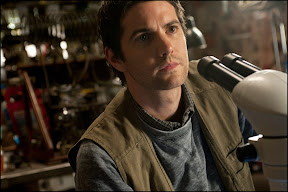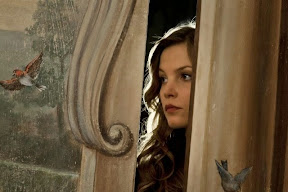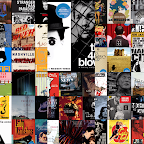In Italian filmmaker Giuseppe Tornatore’s Oscar-winning crossover hit Cinema Paradiso, an old film projectionist forms an unlikely friendship with a budding movie buff while bonding over the illicit frames of onscreen romance that had been censored and left on the cutting room floor by the Catholic Church.
And although he's never managed to duplicate its success, in Tornatore’s subsequent pictures the subjects may have changed but the themes established by Paradiso of lonely outsiders who are brought together as much out of appreciation for their eccentricities as they are by their (near voyeuristic) devotion to various artistic fields remain.
The eponymous Malena, for example was placed on a pedestal as though she were a bronze statue versus a flesh and blood human being by the young boys coming-of-sexual-age in that film. And in The Legend of 1900, Tim Roth’s grown man-child turned piano prodigy refuses to leave the only life he’s ever known aboard an ocean liner. Throughout his oeuvre, Tornatore’s characters are as liberated as they are imprisoned by their artistic obsessions.
Yet even though this idea has been touched on repeatedly in his filmography, he’s never combined that particular thematic double-edged sword with as much deliberate mystery as he does in his latest David di Donatello award-winning thriller The Best Offer.
And like the aforementioned double-edged sword that inevitably ensnares his characters, his latest film is intentionally filled with duplicitous duality from the double-meanings of lines and names that will reverberate later to the Paradiso like mentor/protégé centric set-up of its two main characters whom we discover are just one in a number of double-teaming sets of two that appear throughout the film.
A Hitchcockian take on David Fincher’s The Game as set in the world of art and antiquities where an item’s worth is established by the two part process of appraisal and auctioneering (as executed by Geoffrey Rush’s ethically questionable Virgil Oldman), The Best Offer has all of the unmistakable aesthetic and eccentric hallmarks of a Tornatore production.
And this is especially evident given the way Offer establishes the overwhelming sense of loneliness that haunts Virgil in the film’s earliest frames, which Tornatore builds off of as the work continues to create a pattern wherein – aside from a few scenes that are set at a pub, restaurant or the auction house – the screen is populated by one to three characters at most.
But going even further, the filmmaker ensures that even when Virgil shares the screen with a roomful of people (in scenes few and far between), the cinematographer’s lens is primarily fixated on only one to two individuals regardless in order to deepen the sense of voyeurism that pervades among the art-obsessed collectors and characters on and off the job.
A psychological thriller with Tornatore’s unique fingerprints on display from start to finish, The Best Offer is heightened by yet another incredible score from his frequent musical collaborator, legendary composer Ennio Morricone.
Once again serving up an idealized female that’s presented as an artistic stand-in and is therefore coveted (and allegorically appraised) much like a painting, this time Tornatore employs a much more knowing wink to the audience in a Gothic-tinged May/December romance than he utilized in the slightly exploitative Malena.
Admittedly if you’ve seen more than a handful of mysteries before then it’s fairly easy to see the inevitable twist coming at least 20 minutes into the 131 minute movie.
Nonetheless this puzzle is pieced together with such sophistication and intricate craftsmanship by Tornatore that it’s a delight to watch the picture we’re initially presented be deconstructed before we then go back and reconstruct it ourselves after the end credits roll as I found myself still thinking about the intricate assemblage of clues and layers the next day.
From the overly longwinded and joyless late segment that was famously removed by Harvey Weinstein in the (surprisingly superior) shorter, American cut of Cinema Paradiso and beyond, endings have never been Tornatore’s strong suit. And unfortunately, Offer suffers from the same curse as well in a strange juxtaposition of shots near the film’s close that reeks of a continuity error or reshot and quickly recut ending.
While it’s jarring enough to make you wonder if writer/director Tornatore had originally imagined a much darker fate for one of his lead characters (as one appears to age in reverse over an indiscriminate period of time and two very different locations), fortunately because he had displayed such a firm grasp on everything else up until that point, we’re able to shrug it off.
Righting itself before the final scene, the flawed montage is as easily overlooked as the realization that we saw the ultimate plot twist and character reveal coming right from the start.
The type of work where the less you know about it going in the better, at the same time, you'll find that the more you know about the filmography of Tornatore and the passions that seem to obsess the writer/director as well as his characters, the better able you’ll be to accept his latest mysterious Offer.
Text ©2014, Film Intuition, LLC; All Rights Reserved. http://www.filmintuition.com Unauthorized Reproduction or Publication Elsewhere is Strictly Prohibited and in violation of the Digital Millennium Copyright Act. FTC Disclosure: Per standard professional practice, I may have received a review copy of this title in order to evaluate it for my readers, which had no impact whatsoever on whether or not it received a favorable or unfavorable critique.


















